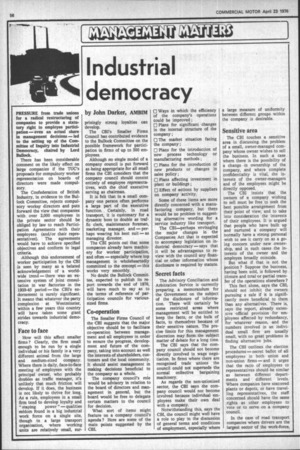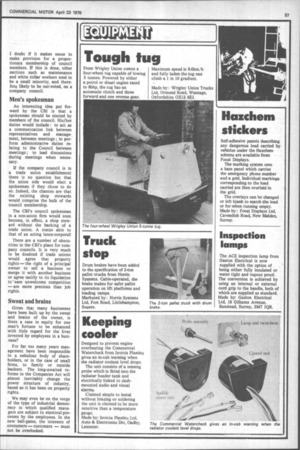Industrial democracy
Page 58

Page 59

If you've noticed an error in this article please click here to report it so we can fix it.
by John Darker, AMBIM
PRESSURE from trade unions for a radical restructuring of companies to provide a statutory right to employee participation — even an actual share in management decisions — led to the setting up of the Committee of Inquiry into Industrial Democracy, chaired by Lord Bullock.
There has been considerable comment on the likely effect on large companies if the TUC's proposals for compulsory worker representation on boards of directors were made compulsory.
The Confederation of British Industry, in evidence to the Bullock Committee, rejects compulsory worker directors and puts forward the view that companies with over 2,000 employees in the private sector should be obliged by law to reach Participation Agreements with their employees (and/or their representatives). The agreements would have to achieve specified objectives and conform to legal criteria.
Although this endorsement of worker participation by the CBI is seen by many as a belated acknowledgement of a worldwide trend — there was an extensive system of joint consultation in war factories in the 193945 period— the CBI's endorsement is surely significant. It means that whatever the party complexion at Westminster, within a few years this country will have taken some giant strides towards industrial democracy.
Face to face
How will this affect smaller firms ? Clearly, the firm small enough to be run by a single individual or his family is a very different animal from the large and medium-sized company. Where there is daily, face-to-face meeting of employees with the principal owner, who probably doubles as traffic manager, it's unlikely that much friction will develop. If it does, the business is not likely to thrive for long. As a rule, employees in a small firm tend to develop loyalty and " staying power " —qualities seldom found in a big industrial work force on a single site, though in a large transport organisation, where working units are relatively small, sur prisingly strong loyalties can develop.
The CBI's Smaller Firms Council has contributed evidence to the Bullock Committee on the possible framework for participation M firms of up to 500 employees.
Although no single model of a company council is put forward as being appropriate for all small firms the CBI considers that the company council should consist entirely of employee representatives, with the chief executive serving as chairman.
It is felt that in a small company one person often performs a large part of the executive function. Certainly, in road transport, it is customary for a dynamic boss to double as traffic clerk, maintenance foreman, marketing manager, and— perhaps wearing his best suit — as managing director.
The CBI points out that some companies already have machinery for worker participation, and often — especially where top management is wholeheartedly committed to the concept — this works very smoothly.
No doubt the Bullock Commit. tee, expected to publish its report towards the end of 1976, will have much to say as to the terms of reference of participation councils for varioussized firms.
Co-operation
The Smaller Firms Council of the CBI suggests that the major objective should be to facilitate co-operation between management and all employees in order to ensure the progress, development and future of the company, taking into account as well the interests of shareholders, customers and the local community. It should assist management in making decisions beneficial to the company as a whole.
The company council's role would be advisory in relation to the board of directors and management in general, but the board would be free to delegate certain matters to the council for decision.
What sort of items might feature on a company council's agenda ? Here are some of the main points suggested by the CBI, 0 Ways in which the efficiency of the company's operations could be improved ; 0 Plans for significant changes in the internal structure of the company; 0 The market situation facing the company ; 0 Plans for the introduction of new process technology or manufacturing methods ; C Plans for the introduction of new products or changes in sales policy ; 0 Plans affecting investment in plant or buildings ; 0 Effect of actions by suppliers on company activity.
Some of these items are more directly concerned with a manufacturing company, but there would be no problem in suggesting alternative wording for a service industry like transport.
The CBI—perhaps envisaging the major changes in the Companies Act that is expected to accompany legislation on industrial democracy — says that it will be advantageous to review with the council any financial or other information whose disclosure is required by statute.
Secret facts
The Advisory Conciliation and Arbitration Service is currently preparing a memorandum for the Government on the subject of the disclosure of information. There will certainly be some restricted areas where management will be entitled to keep the facts, or the bulk of facts, to themselves because of their sensitive nature. The precise limits for this management discretion may form the subject matter of debate for a long time.
The CBI says that the company council should not become directly involved in wage negotiation. In firms where there are recognised trade unions the council could not supersede the normal collective bargaining machinery.
As regards the non-unionised sector, the CBI says the cornpany council would not become involved because individual employees make their own deal with a company.
Notwithstanding this, says the CBI, the council might well have a role to play in the discussion of general terms and conditions of employment, especially where a large measure of uniformity between different groups within the company is desirable.
Sensitive area
The CBI touches a sensitive area in discussing the problem of a small, owner-managed company whose owner wishes to sell the business. In such a case where there is the possibility of a change in ownership of the company, and where complete confidentiality is vital, the interests of the owner-managers and of the employees might be directly opposed.
The CBI insists that the owners of a company wishing to sell must be free to seek the best possible arrangement from their point of view, and to take into consideration the interests of their employees. It is argued that people who have built up and nurtured a company will normally have a strong personal wish to see it carry on as a going concern under new ownership, end in such cases the interests of the owner and the employee broadly coincide.
But what if that is not the position ? Suppose the business, having been sold, is followed by closure and total or partial transfer of the operations elsewhere ?
This fact alone, says the CBI; should not inhibit the owners pursuing a sale if it is significantly more beneficial to them than any .alternatives. There is, says the report, already 'extensive official provision for employees affected by redundancy, for whatever reason, and the numbers involved in an individual small firm are usually small, with no great problems in finding alternative jobs.
The CBI outlines the election procedures— secret ballot of all employees in both union and non-union firms — and it urges that the ratio of employees to representatives should be similar as between different departments and different levels. Where companies have scattered plants or depots, or have travelling representatives, the staff concerned should have the same rights as other employees to vote or to serve on a company council.
In the case of road transport companies where drivers are the largest sector of the work-force, I doubt if it makes sense to make provision for a proportionate membership of council members. If this is done, other sections such as maintenance and white collar workers tend to be a small minority, and therefore likely to be out-voted, on a company council.
Men's spokesman
An interesting idea put forward by the CBI is that a spokesman should be elected by members of the council. His/her duties would include : to act as a communication link between representatives and management, between meetings ; to perform administrative duties relating to the Council between meetings ; to lead discussions during meetings when necessary.
If the company council is in a trade union establishment there is no question but that the union side would elect a spokesman if they chose to do so. Indeed, the chances are that the existing shop stewards would comprise the bulk of the council membership.
The CBI's council spokesman in a non-union firm would soon become, in effect, a shop steward without the backing of a trade union. A status akin to that of an acting lance-corporal!
There are a number of obscurities in the CBI's plans for company councils. It is very much to be doubted if trade unions would agree that property rights — the right of a principal owner to sell a business or merge it with another business or agree tacitly to its liquidation to ease unwelcome competition — are more precious than job rights.
Sweat and brains
Given tha.: many businesses have been built up by the sweat and brains of the owner, is there a case in equity for one man's fortune to be enhanced with little regard for the lives invested by employees in a business?
For far too many years management have been responsible to a nebulous body of shareholders, or in the case of small firms, to family or outside backers. The long-awaited reforms to the Companies Act will almost inevitably change the power structure of industry, based as it has been on property rights.
We may even be on the verge of the type of industrial democracy in which qualified managers are subject to electoral processes by the employees. In the new ball-game, the interests of consumers — customers — must not be overlooked.
































































































